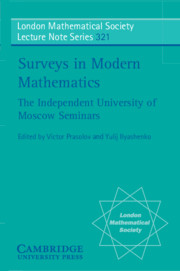Book contents
- Frontmatter
- Contents
- The Independent University of Moscow and Student Sessions at the IUM
- Mysterious mathematical trinities
- The principle of topological economy in algebraic geometry
- Rational curves, elliptic curves, and the Painlevé equation
- The orbit method and finite groups
- On the development of the theory of dynamical systems during the past quarter century
- Foundations of computational complexity theory
- The Schrödinger equation and symplectic geometry
- Rings and algebraic varieties
- Billiard table as a playground for a mathematician
- The Fibonacci numbers and simplicity of 2127 – 1
- On problems of computational complexity
- Values of the ζ-function
- Combinatorics of trees
- What is an operad?
- The orbit method beyond Lie groups. Infinite-dimensional groups
- The orbit method beyond Lie groups. Quantum groups
- Conformal mappings and the Whitham equations
- Projective differential geometry: old and new
- Haken's method of normal surfaces and its applications to classification problem for 3-dimensional manifolds – the life story of one theorem
On the development of the theory of dynamical systems during the past quarter century
Published online by Cambridge University Press: 18 December 2009
- Frontmatter
- Contents
- The Independent University of Moscow and Student Sessions at the IUM
- Mysterious mathematical trinities
- The principle of topological economy in algebraic geometry
- Rational curves, elliptic curves, and the Painlevé equation
- The orbit method and finite groups
- On the development of the theory of dynamical systems during the past quarter century
- Foundations of computational complexity theory
- The Schrödinger equation and symplectic geometry
- Rings and algebraic varieties
- Billiard table as a playground for a mathematician
- The Fibonacci numbers and simplicity of 2127 – 1
- On problems of computational complexity
- Values of the ζ-function
- Combinatorics of trees
- What is an operad?
- The orbit method beyond Lie groups. Infinite-dimensional groups
- The orbit method beyond Lie groups. Quantum groups
- Conformal mappings and the Whitham equations
- Projective differential geometry: old and new
- Haken's method of normal surfaces and its applications to classification problem for 3-dimensional manifolds – the life story of one theorem
Summary
Preface
This essay on the achievements of the theory of dynamical systems (DS) and related areas of the theory of ordinary differential equations and other mathematical disciplines over the past approximately 25 years is very brief and incomplete, especially in comparison with the surveys of the same subject covering earlier periods that were published in the well-known VINITI series “Progress in Science and Technology” and “Current Problems in Mathematics. Fundamental Directions” (the most recent of them partially cover the period considered in this essay). In this connection, I refer to the recent survey of Yoccoz, which considers the subject from a different angle and substantially supplements the list of topics considered in this paper. An extensive material, including quite fresh results, is contained in the voluminous book, which has recently been translated into Russian.
Not only Yoccoz but also a number of other speakers who delivered plenary and large sectional talks at international mathematical congresses told about dynamical systems. All these reports can be recommended as authoritative surveys of various aspects of the subject, which give both prospects and the most current state of the art. I distinguish Yoccoz's report because of its broad scope. Later, a fairly extensive report was made by J. Moser.
The features according to which the material for the first two sections was selected are evident from the titles. The selection was based on clear formal criteria; I believe, it is free of subjectivity in this respect.
- Type
- Chapter
- Information
- Surveys in Modern Mathematics , pp. 70 - 185Publisher: Cambridge University PressPrint publication year: 2005
- 1
- Cited by



